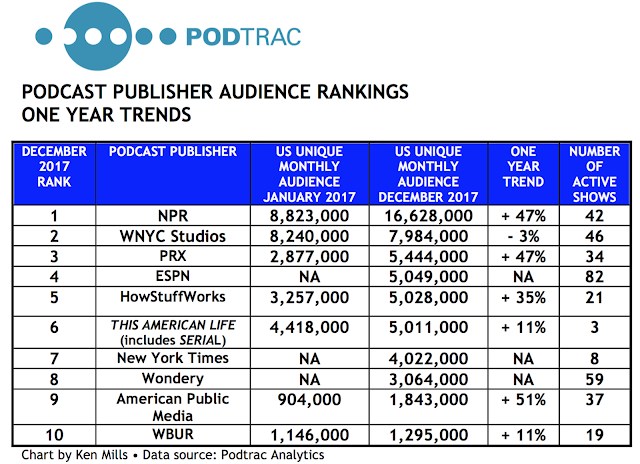 |
| Kelly Burley |
We
have been learning more about public media in Oklahoma since our Friday (1/19)
post about the competition between KGOU and KOSU [link]. We heard from Kelly
Burley, Director of KOSU. Burley said our story was incomplete because we did
not include StateImpact Oklahoma.
Burley
agreed that there is a rivalry between KGOU and KOSU but the bigger story is
the way the two stations are working together. StateImpact Oklahoma [link] is a collaborative news project that
brings together resources from four stations: KOSU, KGOU, KWGS in Tulsa and
KCCU in Lawton.
The
participating stations fund the project. There are currently four full-time
reporters that work under the banner of StateImpact
Oklahoma. Joe Wertz reports on the environment and energy; Emily Wendler
covers education; Jackie Fortier covers health and Quentin Chandler other local
stories. Their reports air on all four Oklahoma stations and digital platforms.
NPR
initiated StateImpact projects in
several states in 2011. The purpose of the program is to generate coverage of
issues and policies that impact people at the state level. Though NPR provides guidance,
it is up to the collaborating stations to pay and house the reporters.
KEN SAYS: I visited the StateImpact Oklahoma website [link] and
the work is impressive. Joe Wertz recently broke national news about the
nation’s deadliest oil rig explosion that happened 100 miles south of Tulsa on
January 22nd. Drilling, fracking and earthquakes are big topics in
Oklahoma with national implications.
THOUGHTS ABOUT KOSU'S PROGRAMMING FROM A COMPETITOR ACROSS THE BORDER
 |
| Fred Fletcher-Fierro |
We heard from Fred
Fletcher-Fierro, an up-and-coming pubmedia producer who is Morning
Edition Host/Producer at KRPS in Pittsburg, Kansas, close to the Oklahoma
border. KRPS indirectly competes with KOSU.
Fred shared his thoughts about KOSU
and KGOU:
From where I sit in
Southeast Kansas at least, KOSU is the more complete of the two stations. The
M-F line up is better and their alternative music footprint is unparalleled in
this neck of the woods.
I don't understand why
KGOU re-purposes weekend programming on the weekdays [see the program
comparison chart on the left].
KGOU
likely spends top dollar to air 1A and then segues into last week’s You Bet
Your Garden.
This makes no sense.
One thing against KOSU, I can tell they are voice track almost everything.
I can't tell the last time I
heard anyone live on KOSU with local news in say a 4,5 or 6 PM hour.
The Spy [a weeknight alternative
rock show] on KOSU is another thing I sometimes
enjoy but it doesn’t have the identity of NPR News, KOSU’s brand.
The Spy makes
KOSU sound like two different stations. This is confusing for listeners.
KEN SAYS: Thanks for the thoughts,
Fred. I see a contradiction in your analysis of The Spy on KOSU.
At the top of your comments you praise the evening
show as “…an alternative music footprint
[that] is unparalleled in this neck of the woods.” Then say later on that
The Spy seems out of place on what otherwise is a NPR News/Talk station.
Consistent
programming 24/7 is an important goal but in a smaller markets “spice” is
important too.
If I living in Pawnee, Oklahoma (which I did for a few months
many years ago), I’d like to hear some cultural programming in addition to the
news.
Plus,
I don’t think going all news/talk would sway many listeners away from KGOU. If
the dual format of alt rock and news/talk makes sense locally then The Spy
should stay.
I
think the more important criticism you made is that KOSU sounds “canned” and
“distant” during ATC. KOSU should correct this problem by having a live, local
voice as an essential part of ATC.
PROOF: NPR IS THE KING OF
PODCASTS
The
December Podtrac ranking of Podcast Publishers demonstrates how dominant NPR is
in the podcast biz.
Not only is NPR’s Unique Monthly Audience up almost 50% in
the past year, NPR now has more than double the number of Unique Monthly
listeners as the number two publisher WNYC Studios.
Also
on the Podtrac publisher rankings, American Public Media was up 51% in Unique
Monthly listeners and PRX was up 47% when comparing data from December 2017
with January 2017. WNYC Studios was the only publisher to loose Unique Monthly
listeners during calendar year.
Below
is Podtrac’s December 2017 Top Twenty podcasts. Note that iHeartMedia is not on
either chart. Podtrac deleted listings for iHeart because the data was found to
be incompatible with Podtrac’s methodology.







Hi Ken,
ReplyDeleteContradiction? Maybe, but both statements can be true. The Spy is, “…an alternative music footprint [that] is unparalleled in this neck of the woods.” I believe that to be accurate. I'm not saying that KOSU should ditch The Spy at all. I listen to the station on my 4 AM weekday drive into work and enjoy the format. I know that formally The Spy had it's own frequency before joining OSU and hope that it will again in the future. I've written and read on satellite radio message boards for years and know that more and more people are getting tired of SiriusXM's tight playlists, sub-pair audio quality and single artists channels. Listeners are looking for stations like The Spy to fill the gap left by these condition. If a few thousand people cancel their satellite radio subscriptions that puts a tiny dent in company that has nearly 33,000,000 subscribers. But if someone of those paying customers come over to Alt-Rock or Triple A public stations that could be a major opportunity.